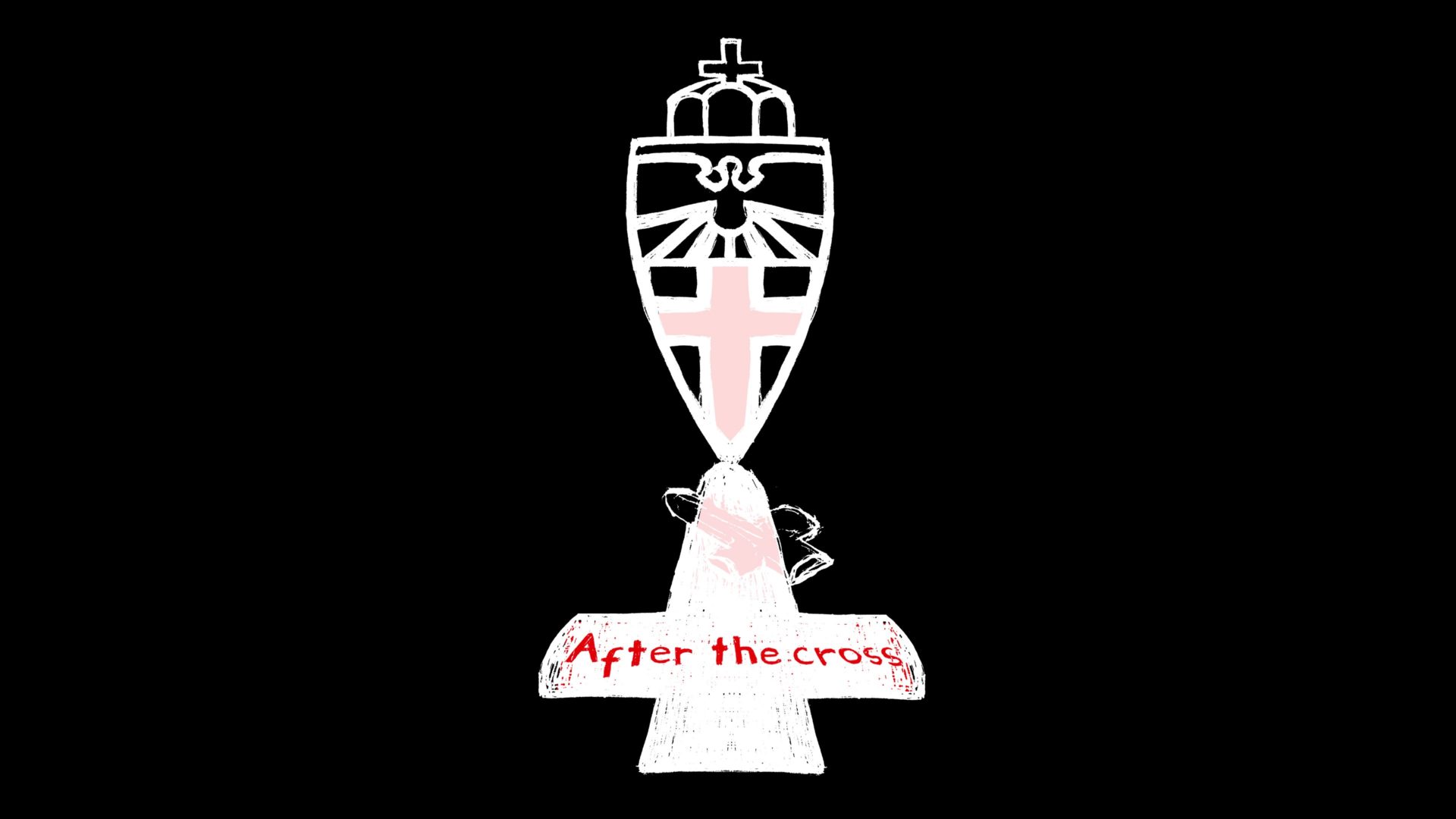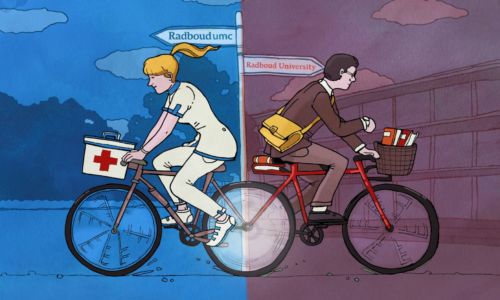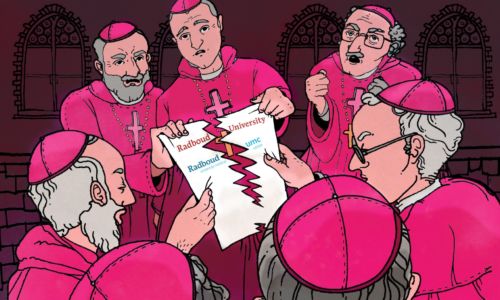Catholic identity doesn’t need to be reinstated as far as students are concerned
-
 Illustratie: Ivana Smudja
Illustratie: Ivana Smudja
Apart from a small, strongly religious minority among Radboud University students, most of the student population has little or no affinity with religion. This was revealed in a survey that Vox conducted among 340 students. Most students have no problem with the fact that the university no longer carries the Catholic predicate. 'It’s not a topic of discussion among students.'
‘Last year, the students received a number of emails from Radboud University about the fact that the Catholic predicate would be withdrawn – perhaps the university itself was not so happy about the withdrawal of the predicate,’ says law student Bo van Maanen. ‘Then I started to read up about it.’
Twenty-one-year-old Abel Buijnsters, who is a Political Science student, read about the conflict between the bishops and the supervisory bodies on NU.nl and on the university’s social media sites. ‘There was no getting away from that news,’ he says.
And Buijnsters wasn’t the only one who heard about it. Nine out of ten students know that the university stopped carrying the Catholic predicate one year ago. This was revealed in the sample of 340 students that was used in the Vox survey (see box).
The Vox survey was distributed among student associations, and was completed by a total of 340 students. Students were able to register for the survey, which means that it’s quite likely that the survey was mostly completed by students who have an interest in religion and the Catholic faith. This was evidenced by the fact that almost one in ten students who completed the survey indicated that they were members of a religious student association. In reality, this percentage is at least four times lower: the five Christian student associations in Nijmegen have a total of 453 members, which is 1.8 percent of the 25,000 students that make up Nijmegen’s student population. The Muslim Student Association (MSV) has 184 members. However, the respondents were well distributed across all of the university’s faculties.
Atheists
Most students haven’t lost any sleep over the fact that the university’s Catholic predicate has been withdrawn. ‘I can’t see the problem,’ says Buijnsters, who is an atheist at heart. ‘The university didn’t pay that much attention to the Catholic identity anyway. It was occasionally mentioned during a speech or was referred to during the Dies. But all in all, it seemed to be more a formality than anything else.’
In fact, says 19-year-old Psychology student Veroniek Kersten: ‘It’s just not a topic that’s being discussed among students.’
 Radboud University’s Catholic predicate was withdrawn one year ago. But what does this mean, what’s changed since then and where does the university go from here? In the past few weeks, Vox published a series of articles on this topic.
Radboud University’s Catholic predicate was withdrawn one year ago. But what does this mean, what’s changed since then and where does the university go from here? In the past few weeks, Vox published a series of articles on this topic.
Twenty-two-year-old Management Science student Wietske Krijgsheld claims that she also doesn’t feel that the withdrawal of the Catholic predicate is a great loss. ‘In a way, I thought it was nice that the university had a Catholic identity, but students really didn’t tend to take much notice of it,’ she says. ‘Anyone who wanted to know more about the Catholic identity and history had to find out about it themselves.’
Vox’s survey revealed that most Radboud University students don’t really have anything to do with religion. Over 75 per cent of the respondents regarded themselves as atheists (50 percent) or agnostics (25 percent). By contrast, a small minority (11 percent) considered themselves to be quite religious – although the real percentage was probably much lower (see box text). This primarily pertained to Catholic and Protestant students.
More than half of the respondents never attended a church service or a service in any other type of house of worship. Of these respondents, 16.8 percent claimed to attend a service less than once a year, while 13.3 percent said that they attended a service at least once a year. This was once again in contrast with a small minority (7.3 percent) who attend church every week. Three quarters of the students said that they never prayed, while 4.1 percent claimed to pray less than once a month and 13 percent said that they pray at least once a week.
House of worship
More than two thirds of Radboud University students have never visited the University Chaplaincy. Less than one fifth of the students pay a visit once a year and only two percent of students visit the chaplaincy on a monthly basis. 16.4 percent of the respondents weren’t even aware of the fact that Radboud University had a chaplaincy.
Until recently, Veroniek Kersten was one of these people. ‘Just last week I happened to find out that there’s a University Chaplaincy, but only because a friend of mine told me about it,’ she says. Nevertheless, Kersten is glad that there’s a University Chaplaincy for anyone who wants to visit it. ‘There’s also a student association for Muslims, so as far as I’m concerned, there should also be a University Chaplaincy.’
‘I think that the University Chaplaincy is a great place to engage in the types of conversation than you wouldn’t have with other people at the university, say someone like a student counsellor,’ says Wietske Krijgsheld, who is a member of the Navigators, which is a Protestant student association in Nijmegen.
Atheist Abel Buijnsters disagrees. ‘Society offers people so many different ways in which they can worship or express their faith. For this reason, I believe that having a prayer room for people of different faiths who want to pray on campus is enough.’
Worship
Most students don’t believe that it’s important for Radboud University to retain its Catholic identity now that it’s no longer a Catholic institution. ‘It doesn’t really bother me if they do wish to retain their identity,’ says law student Bo van Maanen. ‘Despite the fact that we’re a Catholic institution, people from other faiths also seem to be welcome at the university. The University Library even has a separate room for people who wish to pray or be on their own for a while.’
Students are more divided about the proposition that Radboud University should no longer employ religious practices, such as the prayers that are included in academic ceremonies. Approximately one third of the respondents were negative about abolishing these types of practices (i.e. they strongly disagreed, disagreed or slightly disagreed), while one quarter of the respondents felt that it was an excellent idea. ‘I think it would be weird if they continued to include prayers in PhD ceremonies and inaugural lectures,’ says Veroniek Kersten. ‘That would be a slight contradiction if you’re no longer a Catholic university.’
‘I think it would be weird if they continued to include prayers in PhD ceremonies and inaugural lectures’
Abel Buijnsters also feels that there’s no need for the prayer at the beginning of a PhD ceremony. ‘As a secular university, we should either offer people of all religions the opportunity to pray, or not allow any opportunity for prayer. I myself would favour the latter option: not allowing any opportunity for prayer.’
Wietske Krijgsheld feels differently about this. ‘I’d really like it if the university were to retain this tradition. I think it’s a great way of incorporating those norms and values that are part of the university’s history.’
Catholic Students in Nijmegen
A small proportion of Radboud University students belongs to a religious student association, such as Katholieke Studenten Nijmegen (KSN) (Catholic Students in Nijmegen). ‘We combine faith with fun,’ explains Jakob Ruiter, who is KSN’s external secretary. ‘Yesterday we had a mass in the University Chaplaincy and then we shared a meal with our members. Both believers and non-believers are welcome if they’re seeking some reflection or deepening, intense discussions, or fun and fellowship. Next summer, for example, we’ll be travelling to Rome. The Vatican clearly makes it a special place for Catholics, but obviously we’re also going to have fun while we’re there.’
KSN currently has 64 members, which is twenty more than last year. Ruiter has no idea what caused the increase in membership. ‘It could be because of the coronavirus, or the withdrawal of the Catholic predicate.’
Even now that Radboud University is no longer a Catholic institution, KSN members still feel welcome at the university. ‘Radboud University’s involvement hasn’t diminished,’ says Ruiter. ‘This was quite evident at the Orientation Market when the Rector Magnificus came over to have a chat with us. As students, we’re just glad that we’re still able to promote the Catholic identity.’



